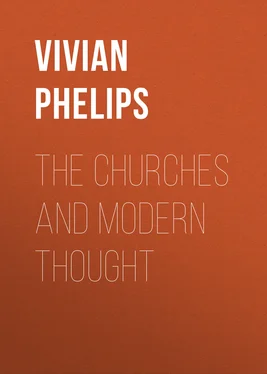Vivian Phelips - The Churches and Modern Thought
Здесь есть возможность читать онлайн «Vivian Phelips - The Churches and Modern Thought» — ознакомительный отрывок электронной книги совершенно бесплатно, а после прочтения отрывка купить полную версию. В некоторых случаях можно слушать аудио, скачать через торрент в формате fb2 и присутствует краткое содержание. Жанр: foreign_prose, foreign_religion, Философия, foreign_antique, на английском языке. Описание произведения, (предисловие) а так же отзывы посетителей доступны на портале библиотеки ЛибКат.
- Название:The Churches and Modern Thought
- Автор:
- Жанр:
- Год:неизвестен
- ISBN:нет данных
- Рейтинг книги:4 / 5. Голосов: 1
-
Избранное:Добавить в избранное
- Отзывы:
-
Ваша оценка:
- 80
- 1
- 2
- 3
- 4
- 5
The Churches and Modern Thought: краткое содержание, описание и аннотация
Предлагаем к чтению аннотацию, описание, краткое содержание или предисловие (зависит от того, что написал сам автор книги «The Churches and Modern Thought»). Если вы не нашли необходимую информацию о книге — напишите в комментариях, мы постараемся отыскать её.
The Churches and Modern Thought — читать онлайн ознакомительный отрывок
Ниже представлен текст книги, разбитый по страницам. Система сохранения места последней прочитанной страницы, позволяет с удобством читать онлайн бесплатно книгу «The Churches and Modern Thought», без необходимости каждый раз заново искать на чём Вы остановились. Поставьте закладку, и сможете в любой момент перейти на страницу, на которой закончили чтение.
Интервал:
Закладка:
In addition to the now fast dwindling band of sincere and thoughtful Christians there are, of course, many professing religionists who do think a little, a very little, on religious subjects; but the bulk of the male element are absolutely indifferent to the question of religion at all. The average subaltern is as good a sample of the latter type as any other. Speak to him about religion, and he is unutterably bored. A certain amount of church-going forms part of his ordinary round of duties. This is the sum-total of his “religious experiences.” For the rest, religion, or any question as to its truth in this or that particular, is, so far as he is concerned, a matter of supreme indifference.
People are usually (though less so now perhaps than formerly) so careful to keep their thoughts about religion to themselves that it is no wonder the Church is ignorant of the extent to which heterodoxy is rife. The colossal hypocrisy which speaks of “the reserve of Englishmen about their religion” needs exposure. Why should there be this dislike to talk upon religion—a religion which, if true, should make all worldly affairs sink into infinitesimal insignificance? Is it from a spirit of reverence, or is it not rather because the interpretations of God’s alleged revelation differ so widely that people neither wish to “give themselves away” by stating their own interpretations, nor to hear the distasteful interpretations of others? If they were perfectly straightforward, they would run the danger both of hurting the feelings and falling in the estimation of their friends.
Sometimes there is a dread of appearing ridiculous, sometimes a dislike of appearing to cant. Yet surely, if we believe what we profess, there is nothing to be ashamed of, and we ought openly to testify to our faith. I can speak from personal experience when I say that the believing heathen of India, whether Hindoos, Mussulmans, or Parsees, have no qualms on this score. They see no necessity for “reserve” in the profession of their faith. They testify to it openly at all times and in all places. It forms, as it ought, an integral part of their every-day life.
This so-called “reserve” is also occasioned by the inability to live up to the ethical ideals demanded by our creed. Men wish neither to be hypocrites nor to be thought hypocrites. It is an inherent fault in Christian ethics that certain portions are not practicable. They are too much dominated by a belief in the near approach of the end of the world. “If we mechanically applied, as rules of conduct, Christ’s ideals of temper, we are certain, from common sense, that universal pauperism, lawlessness, and national extinction would follow.” 9 9 Quoted from What it is to be a Christian , a pamphlet written by the Ven. J. M. Wilson, D.D.
Then, again, there is too much of the presumption that all men have an equal chance in the battle against temptations, and too little acknowledgment of the part played by heredity and environment; and thus the root of the evil is overlooked. Also, if we have a strong “conviction of sin,” which, according to our spiritual advisers, is essential, and if we cannot hope to shake off the burden of sin by our own unaided endeavours, our moral fibre is liable to be weakened, and we may cease to cultivate the all-important qualities of self-reliance and self-respect. Emerson’s advice is far healthier: “The less we have to do with our sins the better.”
Whatever the many causes of this “proud reserve” may be, one of the consequences is that we remain in ignorance of our neighbour’s beliefs. If people discussed religious matters among themselves, they would make some surprising discoveries. The agnostic would find that “believers” are not the hypocrites he sometimes puts them down to be, for he would learn, to his surprise, that they are supremely ignorant of much that he assumed they would be sure to know. The believer would find that there are many more agnostics than he had ever dreamt there were, and he would also learn that their reason for abandoning belief was of a very different nature from what he had supposed.
When agnostics read the lessons in church, as they frequently do, and when, with their aid and the aid of others in various stages of heterodoxy, congregations in church and chapel on Sunday only amount to twenty-two per cent. 10 10 Eighteen per cent. was the figure given by Bishop Ingram, speaking of “Londoners,” in his speech at the annual meeting of the Bishop of London’s Fund in 1904; but, according to the strict results of the census, the figure for London is twenty-two or twenty-three per cent. of the total population.
of the population, and these chiefly women, 11 11 As Mr. Fielding remarks in his book, The Hearts of Men (pp. 217–8): “To one coming to Europe after years in the East and visiting churches, nothing is more striking than the enormous preponderance of women there. It is immaterial whether the church be in England or France, whether it be Anglican or Roman Catholic or Dissenter. The result is always the same—women outnumber the men as two to one, as three to one, sometimes as ten to one.”
what must not be the sum-total of agnosticism, heterodoxy, and indifference among men in this most Christian of nations? The extent of unavowed or unconscious scepticism far exceeds that which is openly avowed or consciously felt. Laxity in keeping the Sabbath is now notoriously on the increase. Nothing can be more sensible than that people who have slaved for six days in the atmosphere of the office, etc., should go off for their “week end’s” golf, etc.; but for the clergy to attribute the consequent falling-off in church attendance solely to the extra facilities of travel tempting people to carelessness about religion is to adopt the method of the proverbial ostrich in the desert at the approach of a dreaded enemy. Unbelief and the advance of rationalism are really at the bottom of this new development; for all the carelessness, all the temptations in the world, would not persuade sane people to throw away their claims to eternal happiness by neglecting to worship their God—a God that demands this worship. How little do the clergy really know, or attempt to know, of the beliefs of the cultured portion of their congregations! As I write these words I receive, curiously enough, a letter which shows how unusual it is for the pastor to question his flock. The writer of the letter, a lady, says: “Isn’t Mr. X (the rector of a certain country parish) a gauche man? Mr. Z (an influential parishioner) didn’t go to Holy Communion, and so Mr. X asked him if he had been confirmed. Since then Mr. Z goes elsewhere to church.” Now, personally, I admire X’s courage. What he did would not be done by the ordinary run of parsons. If they did that sort of thing, they would soon become exceedingly unpopular in the neighbourhood, and lose most of their fashionable and opulent congregation. But they would begin to learn the true state of affairs. They would learn, for instance, that some of the most regular and respectable of the male portion of their congregations were agnostic or heterodox, and that their attendance at divine worship was merely to set a good example to the “lower orders,” or to please their women-folk, or for some cause or other utterly unconnected with any desire to worship or any belief in the efficacy of so doing. There is doubtless a great deal to be said in favour of a spirit of toleration which inculcates non-interference with a man’s belief; but it all helps to hide the true state of affairs, and is surely overdone when it encourages men to attend a service where they are acting a part and making solemn declarations untruthfully.
There is one more type of person I should include among the many strange buttresses of the Church—namely, the person who refuses point blank to be enlightened. The Churches have been lulled into a sense of security by many causes, but chief among them, perhaps, there stands out the fact that people not only will not take the trouble to inquire into the grounds of their faith, but consider that it would be positively wicked to do any such thing. To such I can only repeat the words of the Rev. J. W. Diggle, now Bishop of Carlisle. “There are,” he says, “perhaps, few things, and certainly nothing of similar moment, about which men give themselves so little trouble, and take such little pains, as the ascertainment, by strict examination, of the foundations and the evidences of their religion. Hence so many religious persons are like children who have not learned things accurately. They are fearful of being questioned, and are out of temper in an examination.” However, as an excuse for this timidity—for it is often nothing else—it must be conceded that a deep study of the evidences does, more often than not, end in agnosticism. This gives rise to the serious question: “If it is God who assists us to remain staunch to our creed, why does He so often forsake us, just when we are trying to lead more thoughtful lives and, consequently, study more deeply the faith we profess?” On the one hand, we find that modern agnosticism is not the result of carelessness, but of thoughtfulness. On the other hand, we observe that the Church numbers among some of its firmest adherents not only those who are ignorant through circumstances over which they have no control, or through thoughtlessness, but also those who remain ignorant through fear to inquire.
Читать дальшеИнтервал:
Закладка:
Похожие книги на «The Churches and Modern Thought»
Представляем Вашему вниманию похожие книги на «The Churches and Modern Thought» списком для выбора. Мы отобрали схожую по названию и смыслу литературу в надежде предоставить читателям больше вариантов отыскать новые, интересные, ещё непрочитанные произведения.
Обсуждение, отзывы о книге «The Churches and Modern Thought» и просто собственные мнения читателей. Оставьте ваши комментарии, напишите, что Вы думаете о произведении, его смысле или главных героях. Укажите что конкретно понравилось, а что нет, и почему Вы так считаете.












